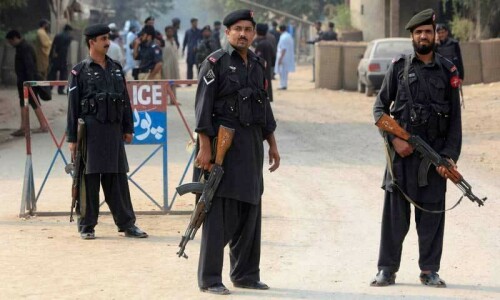PESHAWAR: The Khyber Pakhtunkhwa Health Department has chalked out a new strategy under which it plans to focus on mobile population like internally displaced persons and run an aggressive communication campaign to ensure immunisation of children at risk of contracting polio in the low transmission season from December to May.
The plan has been prepared by the health department in view of the rising number of polio cases in the province. It has planned to run 14 to 16 campaigns in Peshawar, Charsadda, Mardan, Hangu, Lakki Marwat, Bannu, Dera Ismail Khan and Tank; seven in Kohat, Nowshera, Karak, Torghar and Swabi; and four drives in the remaining districts of the province between this December and May to boost children’s immunity against poliomyelitis.
Another feature of the plan is to vaccinate mobile population – also including those travelling on long inter-city routes – as genetic sequencing has shown that at least eight cases resemble with virus from the nearby Federally Administered Tribal Areas, which tops the national polio count with 158 cases.
The province is home to mobile population from Fata and Karachi, a city proven to have transported virus to children in Khyber Pakhtunkhwa.
Govt to recruit vaccinators, focus on mobile population
About 13 campaigns will target an estimated 1.8 million people in 270 union councils, mainly hosting IDPs, to save local children from polio. Simultaneously, children in 430 high-risk UCs will also be given vaccines.
Offi cials said that under the plan an aggressive communication campaign would be run to do away with refusals against the oral polio vaccine (OPV). Ninety per cent of the polio victim children hadn’t been given vaccine because their parents argued that immunisation wasn’t allowed in Islam. To brush aside that misconception, the government wants to enlist support of the local religious scholars who could vaccinate children publicly and issue the statement that parents not vaccinating their children were in fact defying Islam. Scholars will be shown on media, administering OPV to children and saying that parents should fulfi l their religious duty and immunise their children.
Videos carrying messages of parents of polio victims will also be used to woo others to ensure vaccination of their children. The department seeks to establish a security cell at the already approved emergency operation centre at the directorate of health services with offi cials from army and police, to ensure protection to the vaccinators. The centre will analyse the security situation in districts before launching campaigns. Presently, the department has been facing security threats as over 35 people had been killed in the poliorelated incidents.
The centre will have integrated data concerning vaccination as opposed to present mechanism where the donor agencies and government maintained their separate data that created confusion.
The department also wants to recruit vaccinators as government employees so they could be held accountable in case of laxity.
The same teams will be retained for all campaigns in the respective districts so they could know the areas and the people. So far, the department has been hiring volunteers for vaccination who couldn’t be taken to task.
The capacity-building of the vaccinators, including development of their interpersonal communication skills, was also part of the strategy to make sure that they reach their respective target population for vaccination.
The health department will also hold orientation sessions for the commissioners, deputy commissioners and other district government offi cials about the polio-related issues in the areas of their jurisdiction and to suggest measures for their redressal.
Published in Dawn, November 17th, 2014














































